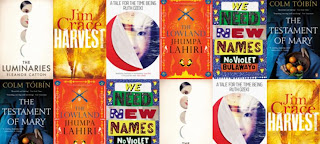Book a Poet closes on 31st March 2014 - we thank you for reading our blog and hope historically it can prove useful to some too!
Tuesday, 10 September 2013
Man Booker Prize Shortlist Announced
The 2013 Shortlist is:
'We Need New Names' by NoViolet Bulawayo (Chatto & Windus)
'The Luminaries' by Eleanor Catton (Granta)
'The Harvest' by Jim Crace (Picador)
'The Lowland' by Jhumpa Lahiri (Bloomsbury)
'A Tale for the Time Being' by Ruth Ozeki (Canongate)
'The Testament of Mary' by Colm Tóibín (Penguin)
When Robert Macfarlane, the chair of this year's Man Booker Prize judges, announced the longlist he called it the most diverse in recent memory. He was right, and the same is still true of the shortlist he and his peers have just selected. The 151 novels they started with represented a tour d'horizon of contemporary fiction, a grand vista that encompassed everything from the epic to the miniaturist. The longlist distilled the numbers but kept the flavour and now the shortlist has intensified it further.
The six books on the list could not be more diverse. There are examples from novelists from New Zealand, England, Canada, Ireland and Zimbabwe – each with its own highly distinctive taste. They range in size from the 832 pages of Eleanor Catton's The Luminaries to the 104-page The Testament of Mary by Colm Tóibín. The times represented stretch from the biblical Middle East (Tóibín) to contemporary Zimbabwe (NoViolet Bulawayo) by way of 19th-century New Zealand (Catton), 1960s India (Jumpha Lahiri), 18th-century rural England (Crace) and modern Tokyo (Ruth Ozeki). The oldest author on the list, Jim Crace, is 67, the youngest (indeed the youngest ever shortlistee), Eleanor Catton, is 28. Colm Tóibín has written more than 15 books, The Luminaries is only Catton's second.
What does such a list say about the taste of the judges? Messrs Macfarlane, Douglas-Fairhurst, Haynes, Kearney and Kelly have now read each of the books at least twice. Any book that bears re-reading has merit. A book that then stands out above its peers is special indeed. The judges' arguments will have been impassioned – no one invests the time and energy to read 151 books without the enterprise mattering to them. The shortlist is a consensus: it is one that shows that the judges have wide-ranging tastes; that they are unswayed by reputations (many big names didn't make the longlist let alone the shortlist); that they have no predilection for one particular genre; or books by one gender (there are four women and two men on the list); that they like new voices as well as familiar ones; that historical fiction has no more precedence than modern; that form is less important than quality.
And what does the list say about the writers? It is clear that the perennial complaint that fiction is too safe and unadventurous is a ridiculous one; it shows that the novel remains a multi-faceted thing; that writing and inspiration knows no geographical borders; that diaspora tales are a powerful strand in imaginative thinking; and that human voices, in all their diversity, drive fiction.
The shortlist, in other words, is fiendishly difficult to categorise. And that is exactly what you would hope from a list selecting from the best that contemporary fiction has to offer. Quality comes in different forms and in 2013 there is plenty of it about.
For further information, please visit the Man Booker Website.
Source: Man Booker Prize Website
Subscribe to:
Post Comments (Atom)

No comments:
Post a Comment